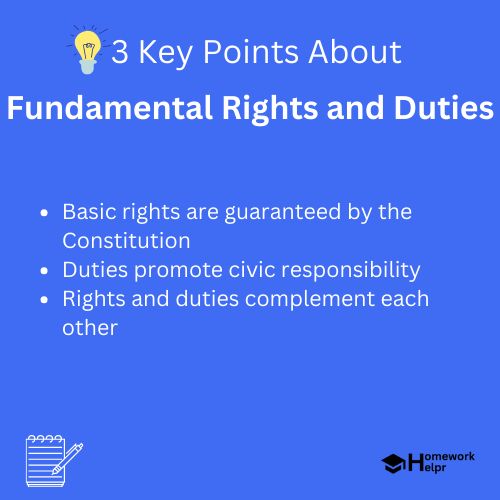📝 Summary
The Fundamental Rights and Duties are crucial for the governance and well-being of society. They ensure every citizen can live a life of dignity and freedom, serving as protection against arbitrary actions. Fundamental Rights include the Right to Equality, Right to Freedom, and the Right to Constitutional Remedies. Meanwhile, Fundamental Duties remind citizens of their responsibilities, such as respecting the Constitution and promoting harmony. Together, these principles foster a democratic system and encourage responsible citizenship and social justice.
Fundamental Rights and Duties
The concept of Fundamental Rights and Duties plays a significant role in the governance and functioning of a nation. These are essential for the well-being of individuals as well as the society at large. Understanding these rights and duties can empower sound citizenry, helping everyone to know what’s expected and what they are entitled to.
What are Fundamental Rights?
Fundamental Rights are the basic human rights guaranteed to all citizens by the Constitution of a country. These rights ensure that every individual can live a life of dignity and freedom. They serve as a shield against any arbitrary actions taken by the government or other individuals. Typically, these rights are enshrined in the constitution and are often non-negotiable.
In many democratic nations, the key Fundamental Rights often include:
- Right to Equality
- Right to Freedom
- Right against Exploitation
- Right to Freedom of Religion
- Cultural and Educational Rights
- Right to Constitutional Remedies

The Importance of Fundamental Rights
The significance of Fundamental Rights cannot be overstated. They help in sustaining a democratic system where individuals can freely express themselves without fear of persecution. These rights foster an environment where everyone can participate in the governance process and address injustices that might occur.
Moreover, Fundamental Rights are essential for social justice and ensure that marginalized groups receive protection from discrimination. For example, every citizen has the right to access courts for justice and to challenge any inequalities that they face.
Definition
Democracy: A system of government in which the citizens exercise power directly or elect representatives. Social Justice: A concept that advocates for a society that is based on principles of equality and solidarity, and that values human rights.
Examples of Fundamental Rights
Examples
One important example is the Right to Equality, which ensures that everyone is treated equally under the law and prohibits discrimination on various grounds such as caste, creed, and gender.
Examples
Another example is the Right to Freedom, which allows individuals to express themselves freely, assemble peacefully, and engage in any lawful profession, business, or trade.
What are Fundamental Duties?
While Fundamental Rights empower individuals, the Fundamental Duties serve as a reminder of the responsibilities citizens have towards their community and the nation. Enshrined in various constitutions, these duties are meant to promote patriotism and enhance the civic sense of the citizens.
Some common Fundamental Duties include:
- To respect the Constitution and the National Flag
- To promote harmony and the spirit of common brotherhood
- To safeguard public property
- To develop a scientific temper
- To protect and improve the natural environment
The Importance of Fundamental Duties
Fundamental Duties are crucial for maintaining the balance between rights and responsibilities. They remind citizens that while they have rights, they must also contribute positively to society.
Being aware of these duties helps foster a society with a strong sense of community and accountability. For instance, safeguarding public property ensures that resources are available for the common good.
Definition
Patriotism: A sense of pride and love for one’s country. Scientific Temper: An attitude that encourages critical thinking and questioning rather than blind belief, essential for societal progress.
Examples of Fundamental Duties
Examples
One example is the duty to respect the Constitution and the National Flag, which fosters a sense of pride and love for one’s homeland.
Examples
Another example is the duty to promote harmony and the spirit of brotherhood, which encourages cooperation among diverse communities.
Interaction Between Rights and Duties
The relationship between Fundamental Rights and Duties is symbiotic; they complement and reinforce each other. When individuals actively perform their duties, they help create an environment where rights can flourish. For instance, when citizens protect public property, they ensure the collective rights of society are safeguarded.
This interaction creates a cycle of social responsibility. A strong citizenry that is aware of its duties will naturally tend to exercise its rights more responsibly. Citizens must recognize that the privileges they enjoy come with responsibilities.
❓Did You Know?
Did you know that in some countries, certain Fundamental Duties are legally accountable? For example, in India, failing to uphold some of the Fundamental Duties can lead to criticism and moral reprimands.
Impact on Society
Fundamental Rights and Duties play a profound role in shaping the character of a society. When citizens are knowledgeable about their rights, they can better safeguard their freedoms. Similarly, an understanding of duties can lead to more engaged and caring citizens.
A community that respects the rights of others and actively performs its duties helps in establishing a harmonious society. This can lead to greater social stability, economic growth, and overall well-being for its inhabitants.
Conclusion
In conclusion, Fundamental Rights and Duties are the cornerstones of a thriving democracy. They empower individuals while simultaneously nurturing a sense of responsibility among citizens. As students and future leaders, understanding these concepts is imperative. It is not only about knowing your rights but also about fulfilling your duties towards the community and the nation. Together, they foster a society where every individual can live with dignity, freedom, and respect.
Related Questions on Fundamental Rights and Duties
What are Fundamental Rights?
Answer: Basic human rights guaranteed by the Constitution
Why are Fundamental Duties important?
Answer: They promote patriotism and civic responsibility
How do rights and duties interact?
Answer: They complement and reinforce each other
What is the impact of understanding these concepts?
Answer: Fosters a harmonious and responsible society
